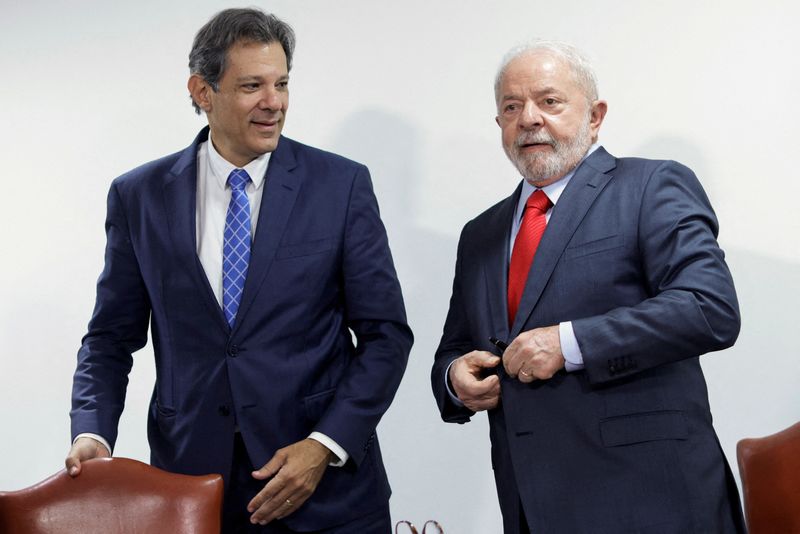Brazil eyes taxes on shareholder payouts, closed-end funds to balance 2024 budget -sources
2023.07.18 18:46

© Reuters. FILE PHOTO: Brazil’s Economy Minister Fernando Haddad greets President Luiz Inacio Lula da Silva during a meeting to sign the government’s economic package at the Planalto Palace in Brasilia, Brazil January 12, 2023. REUTERS/Adriano Machado/File Photo
By Marcela Ayres and Bernardo Caram
BRASILIA (Reuters) – Brazil’s government is considering changes to the taxation of closed-end funds and shareholder payouts in order to shore up revenue in next year’s budget, said three senior economic officials with direct knowledge of the matter.
The government signaled on Tuesday it would propose a comprehensive income tax reform only after the Senate has passed a consumption tax reform that cleared the lower house of Congress this month.
However, the sources, who requested anonymity to discuss internal deliberations, said the Finance Ministry now aims to break off key revenue-raising measures for early passage to bring Brazil’s primary budget deficit in 2024 to zero.
The measures include a new model for taxing closed-end funds, changes to a federal income tax (CSLL) on state tax benefits and the end of “interest on equity” (JCP) payments allowing companies to deduct shareholder remuneration from their corporate tax obligations.
The government sees those measures as crucial to raising revenue and complying with new fiscal rules in next year’s budget, which must be sent to lawmakers by the end of August.
The Finance Ministry declined to comment.
A more complex and structural reform, involving income tax exemptions, taxation of profits and dividends and reductions to payroll taxes, would be presented after the consumption tax reform clears the Senate, the sources said.
“When the budget bill is sent, revenue measures to meet the targets must also be sent, and some of these measures will already appear in the proposal,” said one of the sources. “The idea is that this will be discussed throughout the second half of the year.”
Closed-end funds offer favorable investment opportunities to wealthier Brazilians by taxing earnings only when they are distributed to investors. Previous governments have tried and failed to change that rule and eliminate “interest on equity” payments to shareholders used by companies to reduce taxable earnings.







